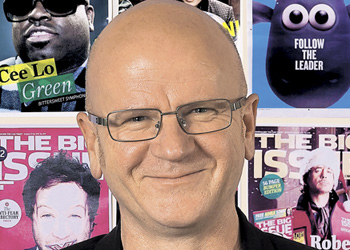The Big Noise Festival takes place this weekend, a music and arts festival that raises money for the Big Issue Foundation. Here the charity’s CEO tells us about their work and how official homeless figures are “just the tip of the iceberg.”
The Big Issue’s very own music and arts festival will take place this weekend at Peckham’s Bussey Building. The Big Noise Festival, now in its second year, has a line-up of mostly British musicians, comedians and artists; performers include MC Rodney P, drum and bass DJ Dillinja, and electronic duo The Correspondents.
All profits from the ticket sales will go to the Big Issue Foundation, the charity that supports vendors of the magazine. The money goes into two main areas: to pay for their “service brokers”, who help vendors with accommodation and welfare, and towards a “vendor support fund”. “It’s what we call the pot of money whereby we get vendors to save 20% of their income towards a personal goal or aspiration” explains the foundation’s CEO Stephen Robertson. “It might be buying a train ticket to connect with family you haven’t seen for the last five years, it might be saving towards a laptop or whatever. We always work on the saving basis and we provide the other 80% to give somebody the opportunity to continue to move their lives forward.”
The Big Issue launched in London in 1991 with the purpose of giving homeless and vulnerably housed people an opportunity to earn a wage by selling copies of the magazine. Vendors are given a pitch and a stack of magazines for free; once these are sold they can buy more at half the cover price of £2.50, keeping the difference for every issue they sell. There are now offices in the Midlands, Oxford, Bath, Bristol, and the South West.
As well as the obvious benefits that come with earning an income, the Big Issue provides day to day assistance. “We encourage vendors to start saving and thinking about the things they want for the future, sometimes it’s something as simple as a bank account. To qualify for any form of support it’ll be paid into a bank account, but lots of our vendors don’t have those because they’ve lost the ID they need to get one, so we help people get passports and birth certificates. When people get housed we often get toasters and kettles and normal things you see in the Argos catalogue.”
After working for Marie Curie Cancer Care and Shelter, Robertson joined the Big Issue Foundation “to get closer to the front line.” He says there is a misconception that the Big Issue is much larger than it really is; in fact there are less than a hundred members of staff. There are around 2,000 active vendors throughout the UK, approximately 500 of which are in London.
Since the economic crisis began figures for homelessness have risen dramatically. “Factors change all the time in terms of what drives people towards homelessness, but in the end it’s around social and financial exclusion, difficulties socially or at home, relationship breakdowns are a really big factor, and also the economy has a real bearing, the safety net is disappearing.”
According to Crisis there’s been a 62% rise since 2010, but worryingly even this percentage is a conservative estimate, as it doesn’t account for people staying in temporary accommodation. “It’s often based on street counts, in other words when you spot someone. Hidden homelessness is something that’s not normally factored into the figures. Rough sleeping is one form of homelessness, then there’s staying with friends and sofa surfing, people staying in hostels and so on and so forth, so the majority of the numbers you’ll see are reflective of people who have actually been spotted at night bedded down on the streets for any period of time. A lot of people who are homeless choose to be invisible on the streets at night because it’s a lot safer. A lot of people who are new to the streets walk the streets at night because it’s safer to sleep in the daytime in shopping centres and train stations.” So realistically figures such as 6,437 rough sleepers in 2012/13 are just a fraction of the actual numbers. “It’s just the tip of the iceberg” says Robertson.
Homelessness is a smear on the capital we can all help to eliminate, and support doesn’t always need to be financial. Yet there continues to be a huge stigma attached to those who are affected. “A legitimate Big Issue vendor will have a tabard and a badge, that person is at work. I think understanding that is the first thing you can do. Actually acknowledging that somebody is there is the second, it’s remarkable how often people say negative things. I think that one of the great things about Big Issue vendors is that it’s very hard to stop and have a conversation in London these days, but vendors are working their pitches, often with very regular hours and people get to know them. Even if you don’t want a copy of the magazine you can say ‘hello, how are you today?’ and engage.”
Earlier this month work and pensions secretary Ian Duncan Smith stated that the Big Issue is being used by Eastern European immigrants to claim tax benefits once they’re set up as self-employed vendors, and therefore aiding “benefits tourism”. “The flaws that he thinks are inherent in the benefits system have been created by the government, it’s a government issue and not one of the Big Issue’s making. The magazine was set up as an opportunity to help people into work and reduce the chance of wrongdoing, in other words giving people a legitimate way of earning some money. Giving people that opportunity to work is quite transformative and reduces the reliance of people on the taxpayer. It’s a problem which we simply didn’t make, we didn’t make the benefit system and we don’t control it, so people who are able to access support through the state are accessing it through the state.”
Comments like these, he says, are potentially harmful to the work they do, given the prejudices that already exist in society. “People who are homeless experience a lot of negativity, a lot of preconceptions. It can be a bit like mental health, ‘well I was depressed once and I pulled myself together, so why can’t you?’”
“One of the phrases I really hate in life is when people talk about ‘the homeless’ like a sort of amorphous blob. People need to break down some of the walls that can easily be built up in life, but particularly in a capital city. The Big Issue is an opportunity for people to earn their own income, and go to work, and that idea of having some money in your pocket at the end of the day that you’ve earned legitimately is a very powerful thing. Just to understand what people are doing in the face of adversity is, I think, worth celebrating.”
Dillinja, Schlomo, Perc, 2 Bad Mice, The Correspondents and Channel One Sound System are performing at The Big Noise Festival on June 14th. For more info visit www.thebignoisefestival.com
Read our interview with Rodney P here.
AIL meets Stephen Robertson
We catch up with The Big Issue's CEO...

Published Jun 13, 2014
